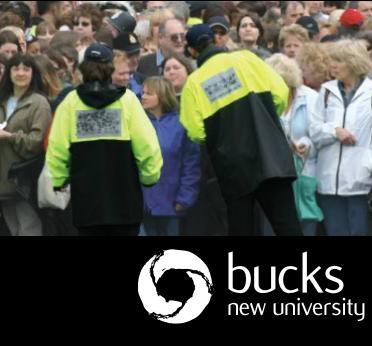

Psychology of crowd safety management
This 30-credit module is part of the BA (Hons) programme in Crowd Safety Management at Bucks New University. For details, contact Louisa Berry: Louisa.Berry@bucks.ac.uk
Module outline
This module is aimed at all professionals who work with, or plan around, crowd safety, including event organizers, stewarding organizations, stadium managers, health and safety officers, and emergency/resilience planners. Those who work with crowds in these contexts depend upon knowledge of crowd psychology in order to enhance positive crowd experiences, maintain safety and security, and to manage risks. This course presents the latest scientific research and thinking in crowd psychology. It is intended to ground crowd management professionals in core concepts and principles transferable across a variety of domains, as well as presenting rationales for practice in specific areas.
Learning outcomes
On successful completion of the module, the student will be able to do the following:
Syllabus
What is a crowd? The first session discusses advantages and disadvantages of crowd typologies, and introduces a fundamental distinction between aggregates (or physical crowds) and psychological crowds that is used throughout the module.
Crowding and ‘personal space’. This session explains why we need a psychological concept of self, building on the distinction between physical and psychological crowds introduced in the last session, to explain how and why the same people seek out and enjoy situations that might in other circumstances be understood as an invasion of space.
The development of crowd psychology’. This session provides a historical perspective by demonstrating how and why the crowd first became an object of science and was defined as a ‘social problem’ by some.
‘Mass panic?’ An empirical and conceptual critique is presented of the common-sense assumption that crowds are particularly prone to 'panic', using case study examples ranging from concert ‘stampedes’, nightclub fires and terrorist attacks.
Collective resilience in crowds. Current thinking on mass reactions to emergencies and disasters is presented. A case study of crowd behaviour in the London bombings of 2005 is presented as an illustration.
Crowd safety vs 'crowd control'. This session discusses how concerns for crowd control, based on crowd managers’ expectations and perceptions of problems in the crowd, can risk compromising crowd safety. A reflexive approach to crowd management is proposed.
Facilitating crowd resilience: from disaster to prevention Principles of crowd psychology are used to derive some recommendations for facilitating collective resilience.
Crowd psychology and the psychology of crowd safety management. The module draws together key messages from across the syllabus to highlight the fact that an understanding of the psychology of crowds requires an understanding of the psychology of crowd safety management.
Return to 'Crowd panic' home page